| Listing 1 - 10 of 29 | << page >> |
Sort by
|
Book
ISBN: 1532630948 9781532630941 1532630956 9781532630958 Year: 2018 Publisher: [Place of publication not identified], CASCADE Books
Abstract | Keywords | Export | Availability | Bookmark
 Loading...
Loading...Choose an application
- Reference Manager
- EndNote
- RefWorks (Direct export to RefWorks)
Judaism and politics. --- Judaism --- Politics and Judaism --- Political science --- Political aspects
Book
ISBN: 3030894738 3030894746 Year: 2021 Publisher: Cham, Switzerland : Springer,
Abstract | Keywords | Export | Availability | Bookmark
 Loading...
Loading...Choose an application
- Reference Manager
- EndNote
- RefWorks (Direct export to RefWorks)
Judaism and politics. --- Judaism --- Politics and Judaism --- Political science --- Political aspects
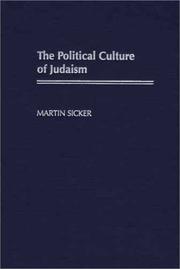
ISBN: 9780313075759 0313075751 0275972577 9780275972578 9780275972578 0275972577 9780275974299 0275974294 Year: 2001 Publisher: Westport, Conn. Praeger
Abstract | Keywords | Export | Availability | Bookmark
 Loading...
Loading...Choose an application
- Reference Manager
- EndNote
- RefWorks (Direct export to RefWorks)
Sicker examines the fundamental norms of civic conduct considered essential to the emergence and moral viability of the good society envisioned in the source documents and traditions of Judaism. The principles underlying the desired behavioral norms constitute the ethical underpinnings of the unique civilization envisioned by Mosaic teaching, a Judaic civilization characterized by instituted norms of civil conduct deemed necessary to ensure appropriate civil relations between persons, individually and collectively. The tensions in Judaic thought regarding the concept of democracy as a paradigm for Judaic government are examined, including the theological as well as moral implications of democracy that cast doubt on its appropriateness as a political ideal. Sicker considers the role of popular consent as a legitimating factor in the Judaic polity, and the distinctively Judaic approach to the ordering of civil relations in society within the constitutional context of a nomocratic regime based on halakhah, Judaism's own dynamic system of canon law. Three fundamental societal issues are then explored. The status of the individual within the properly constituted society and the relationship of the citizen to the state. Included in this discussion is the question of the legitimacy of civil disobedience. Sicker examines the practical implications for public policy of the Judaic imperatives regarding social justice and the idea of prescriptive equality. He then takes a hard look at the classical Judaic approach to dealing with the problems of ensuring national security within the context of Judaic norms.
Judaism and politics. --- Jewish ethics. --- Ethics, Jewish --- Jews --- Religious ethics --- Judaism --- Politics and Judaism --- Political science --- Ethics --- Political aspects
Book
ISBN: 1438456530 9781438456539 9781438456515 1438456514 Year: 2015 Publisher: Albany
Abstract | Keywords | Export | Availability | Bookmark
 Loading...
Loading...Choose an application
- Reference Manager
- EndNote
- RefWorks (Direct export to RefWorks)
In Leo Strauss on the Borders of Judaism, Philosophy, and History, Jeffrey A. Bernstein explores how the thought of Leo Strauss amounts to a model for thinking about the connection between philosophy, Jewish thought, and history. For Bernstein, Strauss shows that a close study of the history of philosophy—from the "ancients" to "medievals" to "moderns"—is necessary for one to appreciate the fundamental distinction between the forms of life Strauss terms "Jerusalem" and "Athens," that is, order through revealed Law and free philosophical thought, respectively. Through an investigation of Strauss's published texts; examination of his intellectual biography and history; and making use of correspondence, archival materials, and seminar transcripts, Bernstein shows how Strauss's concern with the relation between Judaism and philosophy spanned his entire career. His findings will be of use to those interested in the thought of Strauss, the history of Jewish thought, and the relation between religion, philosophy, and politics.
Jewish philosophy. --- Judaism and politics. --- Judaism --- Politics and Judaism --- Political science --- Jews --- Philosophy, Jewish --- Philosophy, Israeli --- Political aspects --- Philosophy --- Strauss, Leo.
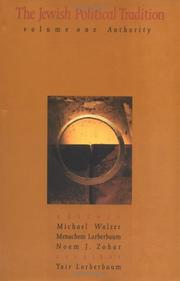
ISBN: 9786611729646 1281729647 0300127723 9780300127720 0300102011 9780300102017 0300078226 9780300078220 661172964X 9781281729644 Year: 2000 Publisher: New Haven Yale University Press
Abstract | Keywords | Export | Availability | Bookmark
 Loading...
Loading...Choose an application
- Reference Manager
- EndNote
- RefWorks (Direct export to RefWorks)
This book launches a landmark four-volume collaborative work exploring the political thought of the Jewish people from biblical times to the present. Each volume includes a selection of texts-from the Bible and Talmud, midrashic literature, legal responsa, treatises, and pamphlets-annotated for modern readers and accompanied by new commentaries written by eminent philosophers, lawyers, political theorists, and other scholars working in different fields of Jewish studies. These contributors join the arguments of the texts, agreeing or disagreeing, elaborating, refining, qualifying, and sometimes repudiating the political views of the original authors. The series brings the little-known and unexplored Jewish tradition of political thinking and writing into the light, showing where and how it resonates in the state of Israel, the chief diaspora settlements, and, more broadly, modern political experience. This first volume, Authority, addresses the basic question of who ought to rule the community: What claims to rule have been put forward from the time of the exodus from Egypt to the establishment of the state of Israel? How are such claims disputed and defended? What constitutes legitimate authority? The authors discuss the authority of God, then the claims of kings, priests, prophets, rabbis, lay leaders, gentile rulers (during the years of the exile), and the Israeli state. The volume concludes with several perspectives on the issue of whether a modern state can be both Jewish and democratic. Forthcoming volumes will address the themes of membership, community, and political vision. Among the contributors to this volume: Amy Gutmann Moshe Halbertal David Hartman Moshe Idel Sanford Levinson Susan Neiman Hilary Putnam Joseph Raz Michael Sandel Allan Silver Yael Tamir
Jews --- Judaism and politics. --- Judaism and state. --- Leadership --- State and Judaism --- State, The --- Judaism --- Politics and Judaism --- Political science --- Zionism --- Politics and government. --- Religious aspects --- Judaism. --- Political aspects --- Political and social conditions
Book
ISBN: 0674056744 9780674056749 9780674050587 0674050584 9780674062139 0674062132 Year: 2011 Publisher: Cambridge, MA
Abstract | Keywords | Export | Availability | Bookmark
 Loading...
Loading...Choose an application
- Reference Manager
- EndNote
- RefWorks (Direct export to RefWorks)
According to a commonplace narrative, the rise of modern political thought in the West resulted from secularization-the exclusion of religious arguments from political discourse. But in this pathbreaking work Eric Nelson argues that this familiar story is wrong. Instead, he contends, political thought in early-modern Europe became less, not more, secular with time, and it was the Christian encounter with Hebrew sources that provoked this radical transformation. During the sixteenth and seventeenth centuries, Christian scholars began to regard the Hebrew Bible as a political constitution designed by God for the children of Israel. Newly available rabbinic materials became authoritative guides to the institutions and practices of the perfect republic. This thinking resulted in a sweeping reorientation of political commitments. In the book's central chapters Nelson identifies three transformative claims introduced into European political theory by the Hebrew revival: the argument that republics are the only legitimate regimes; the idea that the state should coercively maintain an egalitarian distribution of property; and the belief that a godly republic would tolerate religious diversity. One major consequence of Nelson's work is that the revolutionary politics of John Milton, James Harrington, and Thomas Hobbes appear in a brand-new light. Nelson demonstrates that central features of modern political thought emerged from an attempt to emulate a constitution designed by God. This paradox, a reminder that while we may live in a secular age, we owe our politics to an age of religious fervor, in turn illuminates fault lines in contemporary political discourse.
Jews --- Judaism and politics --- Politics in rabbinical literature. --- Political science --- Political science in rabbinical literature --- Rabbinical literature --- Judaism --- Politics and Judaism --- Politics and government --- History of doctrines. --- History. --- Political aspects --- Europe --- Civilization --- Jewish influences.
Book
ISBN: 0585065012 9780585065014 1438420226 Year: 1990 Publisher: Albany, N.Y. : State University of New York Press,
Abstract | Keywords | Export | Availability | Bookmark
 Loading...
Loading...Choose an application
- Reference Manager
- EndNote
- RefWorks (Direct export to RefWorks)
Islam --- Judaism --- Islam and politics --- Judaism and politics. --- Politics and Judaism --- Political science --- Mohammedanism --- Muhammadanism --- Muslimism --- Mussulmanism --- Religions --- Muslims --- Political aspects --- Middle East --- Israel --- Politics and government --- Politics and government.
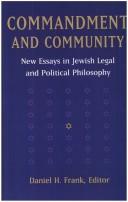
ISBN: 0791424308 Year: 1995 Publisher: Albany State university of New York press
Abstract | Keywords | Export | Availability | Bookmark
 Loading...
Loading...Choose an application
- Reference Manager
- EndNote
- RefWorks (Direct export to RefWorks)
Jewish law --- Jewish philosophy --- Judaism and politics --- Philosophy --- Judaism --- Politics and Judaism --- Political science --- Biblical law --- Civil law (Jewish law) --- Halacha --- Halakha --- Halakhah --- Hebrew law --- Jews --- Law, Hebrew --- Law, Jewish --- Law, Mosaic --- Law in the Bible --- Mosaic law --- Torah law --- Law, Semitic --- Commandments (Judaism) --- Political aspects --- Law
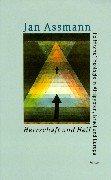
ISBN: 3446198660 9783446253629 3446253629 9783446198661 Year: 2000 Publisher: München Hanser
Abstract | Keywords | Export | Availability | Bookmark
 Loading...
Loading...Choose an application
- Reference Manager
- EndNote
- RefWorks (Direct export to RefWorks)
Der renommierte Ägyptologe Jan Assmann über die politische oder theoretische Legitimation von Herrschaft. Wie seine Studien zu den Wurzeln der Religionen Ägyptens und Israels zeigen, fanden die Staaten- und Rechtsbildungen vor der Entwicklung der religiösen Weltbilder statt. Fundamentale Prinzipien wie Gerechtigkeit, Macht, Solidarität, Schuld, Gesetz und Recht wurden zuerst im Politischen umgesetzt, bevor sie ins Religiöse und Theologische transformiert wurden.
Christianity and politics --- Judaism and politics --- Religion and politics --- 241.1 --- Judaism --- Politics and Judaism --- Political science --- Christianity --- Church and politics --- Politics and Christianity --- Politics and the church --- 241.1 Theologische ethiek: menselijke daden; christelijke antropologie --- Theologische ethiek: menselijke daden; christelijke antropologie --- Politics, Practical --- Politics and religion --- Religion --- Religions --- Political aspects --- Religious aspects --- Egypt --- Religion.
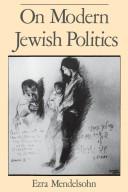
ISBN: 1280654813 0195365046 9780195365047 9780195083194 0195083199 9786610654819 6610654816 0195038649 0195083199 9780195038644 0197715095 Year: 1993 Publisher: New York Oxford University Press
Abstract | Keywords | Export | Availability | Bookmark
 Loading...
Loading...Choose an application
- Reference Manager
- EndNote
- RefWorks (Direct export to RefWorks)
This book is a concise guide to and analysis of the complexities of modern Jewish politics in the interwar European and American diaspora. ""Jewish politics"" refers to the different and opposing visions of the Jewish future as formulated by various Jewish political parties and organizations and their efforts to implement their programs and thereby solve the ""Jewish question."" Mendelsohn begins by attempting a typology of these Jewish political parties and organizations, dividing them into a number of schools or ""camps."" He then suggests a ""geography"" of Jewish politics by locating the c
Jews --- Judaism and politics. --- Judaism --- Politics and Judaism --- Political science --- Zionism --- Politics and government. --- Political aspects --- Political and social conditions --- United States --- Poland --- Politics and government --- 1919-1933 --- 1933-1945 --- 1918-1945 --- United States - Politics and government - 1919-1933. --- United States - Politics and government - 1933-1945. --- Poland - Politics and government - 1918-1945.
| Listing 1 - 10 of 29 | << page >> |
Sort by
|

 Search
Search Feedback
Feedback About UniCat
About UniCat  Help
Help News
News